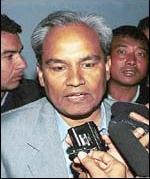 Protestors injured in the April Uprising want representation in the interim parliament. Can the relatives of those killed be far behind? Yet this is just a fraction of the farce masquerading as our peace process.
Protestors injured in the April Uprising want representation in the interim parliament. Can the relatives of those killed be far behind? Yet this is just a fraction of the farce masquerading as our peace process.The elaborately named Comprehensive Peace Agreement brought out our euphoric tendencies in a multiple hues. Those who rejoiced at how King Gyanendra had now become the most humiliated man in Asia perhaps didn’t expect the palace to issue a statement hailing the accord. It does, after all, take uncommon effort to extol the success of your adversaries.
Since that couldn’t be the story line, the palace’s motives dominated the news. But the fallout was conspicuous. For the same critics, Asia’s most humiliated man now retained the power to take over the state if the political actors failed yet again. (Talk about the irrelevance of the monarchy.)
On the republican side, exasperation at the monarchy’s staying power is becoming more and more evident. The feeling in this camp seems to be that Nepalis might not be able to part with the institution so easily. Privately, key campaigners now decry the people as imbeciles.
The anti-monarchy constituency across the southern border remains equally vexed. Why hasn’t the monarch fled the country with whatever he can managed to stash aboard his aircraft? A passive monarch’s motives are being pursued with equal vigor.
It was interesting to read, courtesy an Australian newspaper, how King Gyanendra must be feeling. The monarch feels betrayed, according to former army chief Sachit Sumsher Jung Bahadur Rana, a close adviser to the royal regime.
“The Indian envoy told His Majesty if he stepped down he could become a ceremonial king again,” Rana said in an interview with The Age. “The next day (they) said, ‘India has no role in the future of the monarchy, it’s for the people to decide’,” he said.
Rana added: “The king felt he had been set up… He reinstated the defunct parliament and then everything started to go wrong … the agenda coming from the south (India) was to remove the king, weaken the army and weaken religion.”
Rana makes a point that needs to be advanced. King Gyanendra’s second proclamation on April 22 must have come after hectic negotiations among the principle political players and external stakeholders. The palace’s climbdown was apparent in the text. The draft must have been okayed by the Seven Party Alliance (SPA) in advance. Who took part in those negotiations and what was on the table? With the monarch available to swear in Prime Minister Girija Prasad Koirala, the SPA must have made certain commitments to the palace.
We do know that a U.S. House of Representatives delegation led by Speaker Dennis Hastert called off a visit to Nepal as the protests grew ugly. We also know that the American Embassy had closed down, shifting its visa operations to Delhi. Ambassador James F. Moriarty had warned of a “messy abdication.”
The SPA must have been power-hungry to have accepted the palace offer to reinstate the house. Why didn’t the Maoists continue with the protests and unfurled their flag atop Narayanhity? Were the rebels so convinced of the palace’s opposition to a reinstatement of the legislature that they focused only on the divisions a bloodier crackdown would have created within the royal regime?
Sure, Prachanda and Dr. Baburam Bhattarai savaged the SPA for having accepted royal crumbs. But that sounded more like a cover for restraining their cadres’ from marching on the palace. Was the 12-point SPA-Maoist accord that set the alliance rolling actually intended to maintain that tripartite balance of power New Delhi has always thrived on in Nepal?
Perhaps the palace should claim its share of nominees in the interim parliament. If it hadn’t cracked down on all those curfew violators, we’d still be living under the royal regime.


